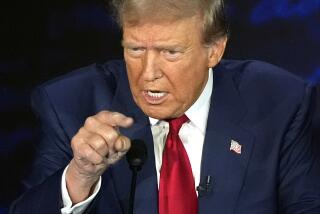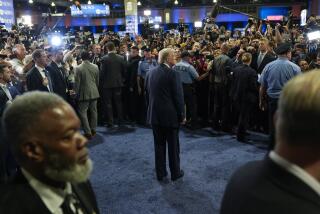Looking for Answers, Florida Voters’ Group Finds Mostly Questions
LAND O'LAKES, Fla. — In the end, neither candidate made the sale.
Doug Bell plopped down in front of the big-screen TV in a friend’s family room Tuesday night hoping the presidential debate between presidential candidates Al Gore and George W. Bush would end his indecision about which one to back.
It didn’t happen.
“I heard a lot of thoughts, but I didn’t hear any plan of action,” said Bell, 50, manager of a retail luggage shop. “I can make proposals all day, but if I don’t have a plan of action and the support of the people to put it into effect, you’re not going to get anywhere.”
Bell was one of nine voters who gathered to watch the debate at the home of Judy Williams, a mother of two and a Republican environmentalist active in water-preservation issues here in Pasco County, a swing suburban community about 20 miles north of Tampa.
Three, including Bell, came in undecided; three leaned toward Gore; two leaned toward Bush; and one solidly backed the Texas governor. In the end, none of them changed their mind, which isn’t good news for either campaign eyeing Florida’s 25 electoral votes.
Once thought a lock for Bush, Florida now is considered a tossup, making it a key contest in the waning weeks of the campaign. And the decision here will likely rest in the hands of people like Williams, who was among those leaning slightly toward Bush.
Going into the debate, Williams, as a Republican, wasn’t too fond of Gore, the Democratic nominee. On the other hand, as an environmentalist, she had trouble warming up to Bush, the brother of her own governor, Jeb Bush.
As the debate unfolded, Williams and her friends laughed at the barbs and ridiculed some of the answers, particularly Bush’s. In general, they felt he was the less polished of the two candidates.
After the 90-minute debate, only two of the voters said it had affected their attitudes even marginally. Both were leaning toward Gore, and they said Bush’s performance nudged them closer to supporting the vice president.
“I didn’t like Bush’s equivocating,” said Michael Burger, 48, a sales consultant. “I didn’t like his answers, and I didn’t like the tenor of his responses.”
But Gore was not without his critics. Jerry Pankey, 58, a telecommunications consultant, said the vice president’s responses confirmed his view that a Gore administration would mean more taxes and higher government spending.
He remained the one solid Bush backer. “It came out the way I thought it would,” Pankey said.
When the two candidates walked out on stage--both wearing dark suits, white shirts and red ties--and shook hands, several of the viewers laughed.
“Power ties,” Williams said.
“They look like the same person,” added Bonnie Belton, a native Tennessean who was leaning toward Bush primarily because of personal dislike for how the Gore family had exercised political power in her home state.
Gore’s father was a longtime senator from Tennessee, and Belton scoffed at the vice president’s efforts to cast himself as a champion of the middle class.
The group listened closely to the debate’s early stages, nodding in agreement at some points and shaking their head at others. Several laughed derisively when Bush said Gore was running a “Mediscare” campaign.
As Gore pushed Bush on the financial details of his Medicare prescription plan, the Republican nominee responded with a joke drawn from Gore’s oft-derided claim that he invented the Internet. Bush said he was starting to believe Gore also invented the calculator.
No one laughed.
“He’s nervous,” Sally Barclay, 49, a Florida pesticide enforcement officer, said of Bush.
Environmental issues struck the strongest chord, with some of the gathering openly arguing with both candidates over energy policies that rely on oil and coal.
“What about solar energy?” Williams asked as Gore spoke.
Although Gore said he wants to target the consumption side of the equation, Burger was bothered by his lack of specifics. “They don’t want to do anything about consumption.”
Abortion rights also drew sharp responses, with three of the six female viewers applauding Gore’s statement that “a woman’s right to choose ought to be protected and defended.” They also disagreed with Bush’s anti-abortion comments.
“He’s encouraging girls to get pregnant,” Barclay shouted out. “Boy, he’s pushing my buttons.”
But none of the women said the candidates’ positions on abortion rights would be the determining factor for their vote.
The debate failed to hold everyone’s attention. Barclay went outside for a cigarette midway through. Three others went to the kitchen for drinks and fell into their own debate as Bush and Gore delved into the criteria under which they would engage American troops in overseas fights.
Perhaps most telling, none could point to specifics that could arise in the remaining debates that would help them make up their mind.
“I don’t think these debates have enough weight to give people the information they need to make a decision,” Bell said. The rest of the crowd sat quietly as the words sank in, some of them nodding in agreement in front of the darkened television screen.
Florida is viewed as crucial to Bush’s bid for the White House--few analysts believe he can cobble together an Electoral College majority without carrying it.
Its tossup status has made the state a regular stop for both campaigns. Gore spent the weekend in the Gulf Coast city of Sarasota preparing for Tuesday’s debate.
This weekend he plans a two-day visit, and Bush plans a two-day swing, including a likely stop in Pasco County.
More to Read
Get the L.A. Times Politics newsletter
Deeply reported insights into legislation, politics and policy from Sacramento, Washington and beyond. In your inbox three times per week.
You may occasionally receive promotional content from the Los Angeles Times.











